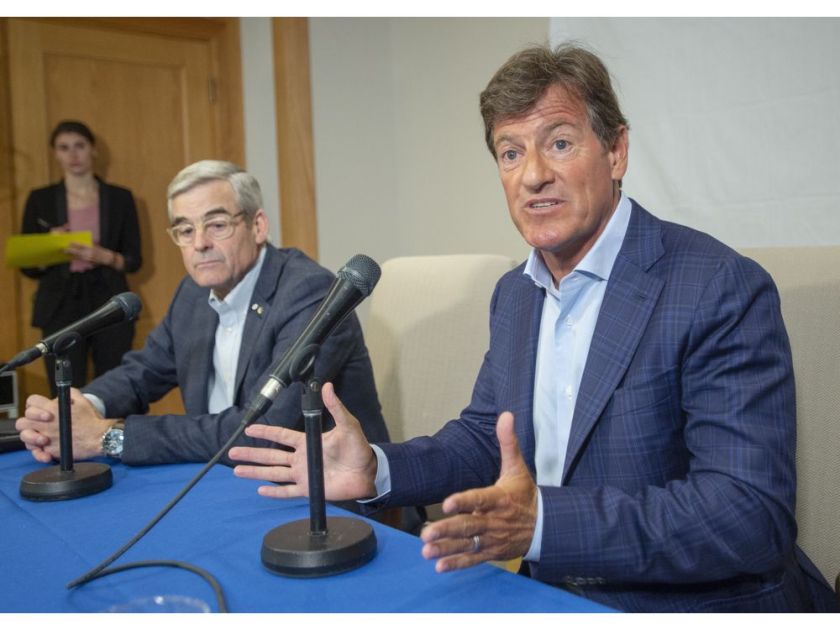But advocate Chloé Duval-Zack says much of the land in the Bonaventure-Bridge area should be used for social housing.
If Montreal’s public consultation office doesn’t sign off on a plan to build a Major League Baseball stadium in Pointe-St-Charles, it would send the message that the city isn’t serious about the sport.
That’s what Stephen Bronfman told reporters after pitching the stadium project to the Office de consultation publique de Montréal Thursday night.
Bronfman, the Baseball Montreal group, and the developer Devimco are in talks to buy a 40-acre plot of land near the Bonaventure Highway and convert it into a $2.5-billion complex of condos, commercial properties and an outdoor stadium. Though it’s still “early days” in the planning, Bronfman said the outdoor stadium would take up roughly 10 acres of land and seat upwards of 34,000 people.
“Here’s a great opportunity not just to build a baseball stadium near downtown but also to help with a theme of redevelopment of a sector of the city to make people proud,” Bronfman said. “This could add so much to our downtown, to our city, to everything we stand for.”
The public consultation heard proposals about what to do with the 2.3-square kilometre patch of formerly industrial lots between the Victoria Bridge and Old Montreal. The area, known as Bonaventure-Bridge, is home to landmarks like the Five Roses sign, Habitat 67 and a number of silos that hearken back to Montreal’s days as a grain shipping mecca.
Alluding to last week’s climate march, which brought an estimated 500,000 people to the streets of Montreal, Bronfman described the stadium as a “green project.” He said the facility would collect and recycle rainwater, that it would use geothermal energy, compost its waste, donate excess food to local charities and minimize parking spots so people won’t drive to the site.
Though the potential stadium is far from a métro stop and sandwiched between rail yards and the Lachine Canal, he said he wanted to work with Montreal’s transit authority to get a shuttle from downtown to the stadium. Once Montreal’s new commuter REM train is complete, Bronfman said it would have a stop at the stadium.
“It’s also a 22-minute walk from downtown to the site,” he said. “I’ve done it many times.”
Of course, building a stadium is only half of the equation. Bronfman, former Canadiens president Pierre Boivin and Baseball Montreal are working on a deal to have the Tampa Bay Rays play half their home games in Florida and the other half in Montreal. Stu Sternberg, the owner of the Rays, has said that such an arrangement would be ideal for his team and Major League Baseball appears to be on board as well.
But would a stadium, condo towers and thousands of new people be welcomed in a neighbourhood with long waiting lists to access social housing? Chloé Duval-Zack, who also spoke at Thursday’s meeting, says much of the land in the Bonaventure-Bridge area should go toward subsidized housing.
“There’s a need to keep a social balance in the area … to build housing for low and modest income families,” said Duval-Zack, who works with Bâtir son Quartier.
About 23,000 households are on a waiting list to access subsidized housing and studies suggest thousands of families are moving off island each year to find more affordable lodging.
There’s also the question of whether public funds will be used to finance the baseball project. When she ran for mayor in 2017, Valérie Plante said she wants Major League Baseball back in town, but campaigned on a promise not to use taxpayer money to make that happen.
One expert at Thursday’s meeting says a taxpayer investment in pro baseball won’t show any return to taxpayers.
“Not a nickel,” said Moshe Lander, an economics professor at Concordia University. “It doesn’t deliver benefits, it just displaces economic activity from one area to another area. … What you get, in terms of value, is civic pride.”
For his part, Bronfman insists there’s a solution where Montreal can have its baseball cake and eat it, too.
“There’s gonna be plenty of social housing projects … in this whole redevelopment,” Bronfman said. “We’ve been at this for more than seven years, but in this past year it’s snowballed and picked up a lot of steam. It’s sort of a perfect storm … the whole situation with the commissioner and (MLB) is going quite well.”



























